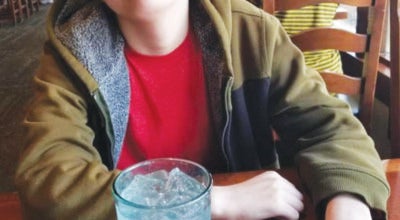The Literary Corner: Renegade Writer’s Guild
Published 8:48 am Saturday, April 1, 2023
|
Getting your Trinity Audio player ready...
|
People Skills
By Marie Craig
When my sons were young, we checked out many library books. Some were just fluff; some adventure, and some life lessons. One book in particular stands out. The title was The King’s Stew. I have searched in vain for the author’s name and a method of buying it. I guess nobody else thought it was as special as I did. I’m not sure my sons remember it, but I hope they learned a life’s message from it.
In a certain kingdom, there was a king who was very particular about his diet. His favorite food was stew. When his best cook became too old to prepare it anymore, he sent out an announcement far and wide for people to apply for the job. The test was to prepare stew for the king. His taste test determined if the new cook had been discovered.
In this same kingdom, there was a young man who was a little challenged in the intellect, but he decided that he would apply. When he finally arrived at the castle, there was a long, long line of applicants. So he filed in at the end of the line. There was rejection after rejection as the king evicted the people trying to create the perfect stew.
Finally, it was his turn. The king was very weary and tired from tasting all the stew and sending would-be cooks home. This young man said, “I don’t know exactly how you like your stew, but would you make a batch and show me, and then I can make it just like yours.” Nobody else had asked ahead of time what the king wanted. The king was delighted because he loved to cook but just didn’t have time to cook for himself with all of his duties.
The king made a delicious stew, and the young man watched and took notes. They had a lovely meal together after which the king said, “You’re hired! When can you start?”
Perhaps there are lessons here for all of us. We have so many preconceived notions that sometimes we don’t ask another person exactly what they want.
Strong Women
By Denise Bell
Women’s History Month. Historically strong women.
Do we grow into strong women because or in spite of our mothers? When does a strong woman become strong? When they change history, the history that we read of centuries later. Or the family history, that doesn’t appear in books, isn’t noted in our nation’s history but just in the journals and diaries. In hearts.
I see the strong woman my granddaughters have already become. Making decisions about things that most women do not ever have to make in their lifetime let alone in their twenties and teens.
Katie and AZ and DPS
I am non-confrontational to the point of being a coward. I run from any circumstances that may turn to an argument. I feel that people who engage in these conversations are certainly unlikely to hear any of the remarks I would offer. So I turn away.
We should unite, support, lift up and celebrate each other. Not this month but all the year
Knowing when to stand up and when to back down is what I think makes a strong woman even stronger.
I certainly don’t consider myself a strong woman; however, if I made it through all those tough moments in my life, I must be. I see strong woman everywhere around me.
My granddaughters
My daughters
My friends
My sisters and family
Women from history
Bloopers
By Gaye Hoots
I inherited a slightly skewed sense of humor from my father, Ken Hoots. I don’t have the memory that he did for jokes and stories, but if you knew him, you remember him for this. My ability to laugh at myself has kept me entertained, and I will share a few of those memories.
In high school, I had Mrs. Jamerson for Geometry, a math I understood and could apply, unlike Algebra. I think one reason was that I never believed I would use Algebra, and even as a nurse, I rarely needed it. Mrs. Jamerson was a well-liked and kind teacher and had never embarrassed a student. I was surprised when she announced she was returning our exams and that she had tried to get us off to a good start by asking a simple question worth two points as a “freebie.” She continued, “Gaye was the only student to get this question wrong (long pause), but it was the only one she missed.” She gave me a ninety-eight and a lesson in skimming what I thought was an easy question.
As a single parent, I had to learn to negotiate car repairs and many other things. I usually call at least two repair shops for advice and prices on parts and labor. When my brake pads needed to be replaced, I called a second shop for prices and asked what the cost was for reversing my rotors if needed. The manager told me he had no idea what I was talking about. I was sure the word I wanted was the same as to reverse. Finally, I remembered the phrase turn the rotors, and we were back on track.
As I was a nursing student, I went with a nurse into the room of a patient with both legs broken. He explained that he had stopped along a highway at night to help a teenager whose battery had died. As they stood between their two vehicles, a car sped toward them, hitting them and breaking their legs as they were crushed between the bumpers. The first words out of my mouth were, “I guess being a good Samaritan is not always a good idea.” The other nurse pinched me and hissed into my ear, “Gaye, he is a minister!”
My girls were in a church group called Acteens and thoroughly enjoyed the activities with their group leader. I was working on a unit to treat substance abuse, where I had to learn a lot of new terminologies. One night a friend called and asked for the girls. I told them they had gone to their Alteens meeting, a group for children of alcoholics. When the girls returned, I told them who had called and what I had said. One replied, “Mama, our group is Acteens, not Alteens, but that’s OK; I will just tell them you are the alcoholic!”
In the addiction unit, no one was allowed to wear clothing referencing alcohol or drugs. One morning as I was dispensing meds, the man in line was wearing a Charlie Daniels tee shirt which I asked him to remove. He stated it was his only shirt and agreed to turn it inside out. Another nurse approached and said, “Gaye, that is a Charlie Daniels shirt, a musician, not Jack Daniels, a brand of alcohol.” The man replied, “Charlie is well known for alcohol use too, so I will just leave it reversed.”
I lived in a log cabin on Odell Myers Rd. for several years, and a girlfriend once stayed with me for a week. The phone awakened me in the middle of the night. The voice was husky and breathy, and I could not hear. I told them that and asked them to return the call hoping for a better connection. When I answered the second call and listened the message I slammed the phone back into the cradle. A laughing voice from the adjoining room called out, “Let me guess, an obscene phone call and who, but you, would say, ‘speak up, talk louder, call me back’”.
Years before I owned a condo near the ocean, I visited a friend whose parents owned a place there. I was visiting and watching TV when suddenly all I saw was black and white. I asked them what was wrong with the set as all the colors had disappeared. “Gaye, that is two penguins on an ice floe; what colors were you expecting?” was the reply.
The drive from home to the coast was one I made often and almost on automatic pilot. One of my regular pit stops was near Pittsboro, where a Hardees and bank were the only buildings. One day I pulled up to the drive-thru and ordered my burger. The smiling teller pointed to Hardees, a few feet away, and said, “You aren’t the first to order food here.”
“Laugh, and the world laughs with you.”
Awareness: The First Step
By Julie Terry Cartner
An internship with a senator, he thought. I’m on my way! A rising senior at a North Carolina university, the young man, a political science major, needed to gain as much practical experience as possible before heading to law school, so an internship such as this was exactly what he needed. Thrilled with the opportunity, he began making plans. Excitement turned to frustration when he checked bus schedules and realized how long it would take him by bus to make the fifteen mile trip. He would be on the bus for hours each day which would conflict with other obligations.
Why not drive, you might ask. This young man, physically and visually disabled, can’t drive. The only viable solutions are the bus or a ride share. An Uber would cost more than twenty dollars a day. Even though he’s a student with student loans, the young man goes further into debt financing his daily trip to this unpaid internship.
Fast forward a year: The young man, accepted into law school, is searching for an apartment, trying to find one on a bus route that will take him to the campus. The law school is in a fairly small town, and the bus trip will take over ninety minutes, including switching busses.
Despite the looming difficulties, the young man fights for his dream and attends the school, relying on his brother, classmates, and the bus to get him to law school and back home each day.
Transportation is only one area of stress this young man faces. He’s followed in stores by security thinking he’s drunk. He’s embarrassed in airports when TSA holds him back every flight because he seems “off.” He’s treated like he has mental challenges to the point of strangers asking, “What’s wrong with him?” and others shouting questions at him like he’s three years old.
And yet, despite, the challenges he’s faced, this young man graduated from college in three years, was accepted into and graduated from law school, passed the Bar on the first try, and is now a lawyer, living independently in Washington DC.
This is one story of many; it just happens to be one that I know. People with developmental disabilities struggle, not only with the challenges of their physical impairments, but also with the biases and misconceptions of an often-unforgiving world. Awareness is a necessary step towards changing this mentality. You’ve heard the saying: Do not judge others until you’ve walked a mile in their shoes…
Picture this: It’s 10:00 at night, and you realize you need milk. What do you do? You grab your car keys and drive to the store to buy what you need.
Picture this: It’s 10:00 at night, and you realize you need milk. You’re disabled. The bus stops running at 10:00. What do you do? You live without milk because there’s no way for you to get to the grocery store.
Picture this: You are getting ready to fly to Atlanta. Right before you get to the security check, you lean down and slip off your shoes, then walk through the scanner. You put your wallet and cell phone back in your pocket and head to your gate.
Picture this: You’re getting ready to fly to Atlanta. As you go through the line, you see people watching you because you walk unsteadily due to your disability. You get to the scanner, but you can’t take your shoes off while standing because if you try to stand on one foot, you’ll fall. You’re pulled aside, searched for weapons, possibly given a breathalyzer, and thirty or forty-five minutes later, you’re finally cleared.
These are only two of the many occurrences facing our disabled population.
What can you do?
• Be aware. Consider the challenges developmentally disabled persons face.
• See the person, not the disability.
• Treat all persons with courtesy and respect.
• Lobby for better, affordable public transportation
“National Developmental Disabilities Awareness Month (DDAM)…is a nationwide event to raise awareness about the inclusion of people with developmental disabilities and address the barriers that those with disabilities face… About 15% of the world’s population lives with a disability. DDAM is about … making sure everybody has the same opportunities in every aspect of life to the best of their abilities.”
“National Developmental Disabilities Awareness Month – March 2023.” nationaltoday.com]





